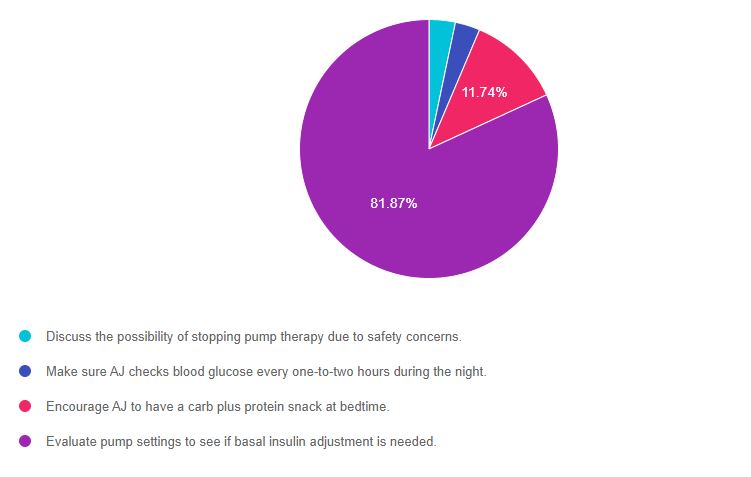
Our October 13th Question of the week quizzed test-takers insulin pump management for an older person with type 1 and dementia. The majority of respondents (82%) chose the correct answer! Great job. Even though most of you got it right, we think it is an important topic to explore and discuss.
Before we start though, if you don’t want any spoilers and haven’t tried the question yet, you can answer below: Answer Question
Question: AJ is 89 years old with type 1 diabetes and is a caretaker for a partner with dementia. AJ is on an insulin pump and uses a meter to check blood glucose levels 4-7 times a day. AJ mentions that they were surprised the other morning that their blood glucose was 59 mg/dl and they felt fine.
Based on this, what is the best action?
Answer Choices:
- Discuss the possibility of stopping pump therapy due to safety concerns
- Make sure AJ checks blood glucose every one-to-two hours during the night
- Encourage AJ to have a carb plus protein snack at bedtime
- Evaluate pump settings to see if basal insulin adjustment is needed

As shown above, the most common choice was option 4, the second most common answer was option 3, then option 1, and finally option 2.
Getting to the Best Answer
If you are thinking about taking the certification exam, this practice test question will set you up for success. Test writers anticipate possible answers based on the details in the question. They will wave those “juicy answers” right under your nose. Your job is to weed through the particulars, pluck out the most important elements and choose the BEST answer.
Answer 1 is incorrect. 3.28% chose this answer, “Discuss the possibility of stopping pump therapy due to safety concerns”. For older clients, safety is a top priority. However, based on this vignette, there has not been a pattern of lows and AJ is able to check glucose levels on a regular basis. In addition, for people with type 1, insulin pump therapy decreases the ups and downs associated with multiple daily injections and offers more dosing flexibility. So instead of stopping the pump, suggesting the use of continuous glucose monitor could be another option.
Answer 2 is incorrect. 3.11% of you chose this answer, “Make sure AJ checks blood glucose every one-to-two hours during the night”. Safety is a big issue for older adults, but checking every one-to-two hours is not realistic and would be very disruptive to sleep. They could consider a 2-3am glucose check to see if blood sugars are trending down. If blood sugars are trending down, they could decrease the basal rate overnight to protect against morning hypoglycemia.
Answer 3 is incorrect. About 11.74% of respondents chose this, ” Encourage AJ to have a carb plus protein snack at bedtime”. This is not the best answer because we don’t have any information on the level of nighttime glucose. It is true, that for older people on insulin pumps, going to sleep with a glucose of 150 mg/dl or greater is important to protect against nocturnal hypoglycemia. But, if the bedtime glucose was less than 150 mg/dl, AJ would just need a 15-30 gm carbohydrate snack. Studies have found that adding protein doesn’t help prevent hypoglycemia, it is the carbohydrates that protect against falling blood sugars.
Lastly, we don’t want to have to “feed the insulin”. If basal insulin is set correctly overnight, AJ would wake up with glucose on target, even without eating a bedtime snack.
Finally, Answer 4 is correct. 81.87% chose this answer, “Evaluate pump settings to see if basal insulin adjustment is needed”. YES! If basal insulin is set correctly overnight, AJ would wake up with glucose on target.
I encourage people on insulin pumps to write down their basal rates, carb to insulin ratios, and corrections factors, on a piece of paper with a date. Then take a picture of it on their phone, so they can always access it and evaluate if those calculations might need a little tweaking as the body changes over time. And of course, we need to include the support person in all these discussions since AJ is living with dementia.
We hope you appreciate this week’s rationale! Thank you so much for taking the time to answer our Question of the Week and participate in this fun learning activity!
Coach Beverly has created three amazing Toolkits to help you study for the CDCES Exam.
Test Taking Toolkit – 200+ Practice Questions!
“This is one of the best review courses I’ve ever taken.”
“I learned so much from the CDCES Exam Prep Toolkit. I now have an assessment after taking the practice exam on the areas I need to focus my studying.”
Student Feedback

Whether you are preparing for the CDCES or BC-ADM exam, this test-taking toolkit is designed to prepare you for success. This toolkit includes two courses with over 200 practice questions to help you prepare and simulate the exam. Plus, we have added a FREE bonus course, Language, and Diabetes – What we say matters. Coach Beverly added this course because she believes it contains critical content for the exam and for our clinical practice!
Sign up for Diabetes Blog Bytes – we post one daily Blog Byte from Monday to Friday. And of course, Tuesday is our Question of the Week. It’s Informative and FREE! Sign up below!
[yikes-mailchimp form=”1″]Accreditation: Diabetes Education Services is an approved provider by the California Board of Registered Nursing, Provider 12640, and Commission on Dietetic Registration (CDR), Provider DI002. Since these programs are approved by the CDR it satisfies the CE requirements for the CDCES regardless of your profession.*
The use of DES products does not guarantee the successful passage of the CDCES exam. CBDCE does not endorse any preparatory or review materials for the CDCES exam, except for those published by CBDCE.








